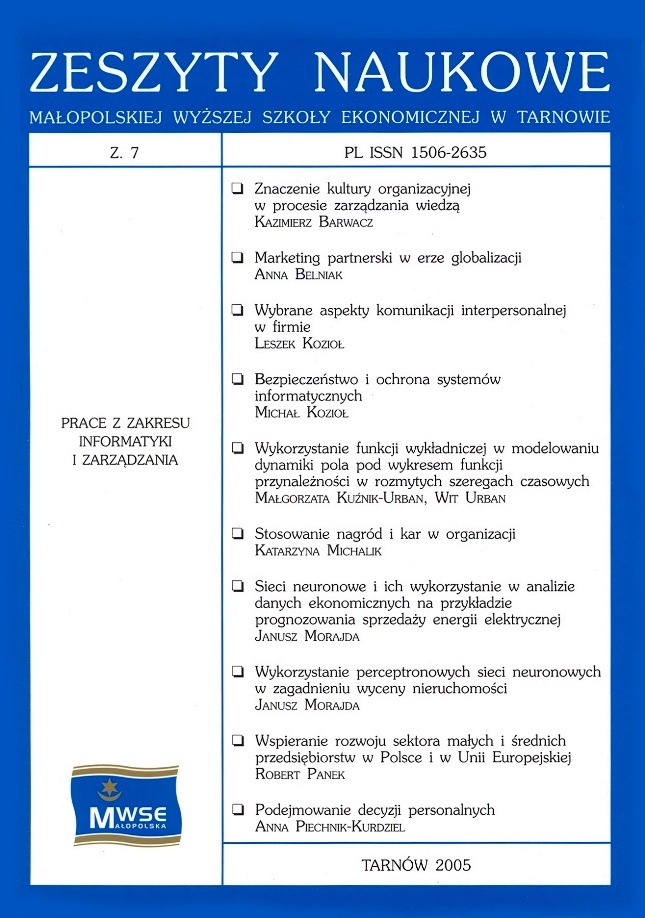Abstract
An analysis of scalar properties of coefficients constructed for fuzzy numbers is one of the methods used to overcome problems resulting from the multidimensional character of such data. A similar approach was employed to prove, on simulation basis, the viability of combining linear and exponential transformations in modelling the dynamics of a field beneath a graph representing membership function in fuzzy time series generated with difference equations. The paper includes descriptions of both the method used to verify the hypotheses and the conclusions arrived at, also those related to the general formula of such a model.
References
Anile A. M., Deodato S., and Privitera G., Implementing fuzzy arithmetic, Dipartimento Di Matematica, Università Degli Studi Di Catania, Italy, 1994.
View in Google Scholar
Chang W. K., Chów L. R., Chang S. K., Arithmetic operations on level sets of convex fuzzy numbers, Fuzzy Sets and Systems, 1984.
View in Google Scholar
Forrester J. W., Principles of systems, Industrial Dynamics (MIT Press, Cambridge Mass.), 1968.
View in Google Scholar
Hanczar P., Symulowane wyżarzanie - optymalizacja procesów logistycznych [w:] Ekonometria czasu transformacji, pod red. A. S. Barczaka, WU AE, Katowice 1998.
View in Google Scholar
Homer J. B., Why we iterate: scientific modeling in theory and practice, „System Dynamics Review", Spring 1996, vol. 12, s. 1-19.
View in Google Scholar
Kaufmann A., Gupta M. M., Introduction to Fuzzy Arithmetic: Theory and Applications, New York: Van Nostrand, 1985.
View in Google Scholar
Klir G. J., Pan Y., Constrained fuzzy arithmetic: Basic questions and some answers, Soft Computing 2 (1998), no. 2, s. 100-108. 7
View in Google Scholar
Munakata Y, Fuzzy systems: An Overview Communications of the ACM, March 1994, vol. 37, no. 3, p. 69-76.
View in Google Scholar
Navara M., Zabokrtsk'y Z.: Computational problems of constrained fuzzy arithmetic. In: The State of the Art in Computational Intelligence, P. Sinc'ak, J. Vasc'ak, V. Kvasnicka and R. Mesiar (eds.), Physica-Verlag, Heidelberg; New York 2000, p. 95-98.
View in Google Scholar
Resnick R., Halliday D., Fizyka, PWN, Warszawa 1973.
View in Google Scholar
Schuster H. G., Chaos deterministyczny. Wprowadzenie, PWN, Warszawa 1995.
View in Google Scholar
Song Q., Leland R. P. and Chissom B. S., A new fuzzy time-series model of fuzzy number observations, Fuzzy Sets and Systems, August 1995, vol. 73, p. 341-348.
View in Google Scholar
Turksen L. B., Stochastic Fuzzy Sets, A Survey Lecture Notes in Economics and Mathematical Systems series, vol. 310, Springer 1988, p. 168-183.
View in Google Scholar
Urban W., Wykorzystanie teorii grawitacji w analizie funkcjonowania systemów społeczno-ekonomicznych, ZN AE, Kraków 2002.
View in Google Scholar
Urban W., Wprowadzenie do skalarnej analizy chaosu deterministycznego w przestrzeni rozmytych liczb rzeczywistych, ZN AE, Kraków 2001.
View in Google Scholar
Urban W., Podstawy rozmytej dynamiki systemowej, AE, Kraków, 1999.
View in Google Scholar
Wołoszyn J., Urban W., Symulacyjna aproksymacja uwarunkowań numerycznych wykorzystania ogólnej teorii grawitacji do opisu relacji społeczno-ekonomicznych, ZN AE, Kraków 2002.
View in Google Scholar
Wołoszyn J., Urban W., Koncepcja filtru aproksymująco-przeskalowującego w działaniach arytmetyki rozmytej, AE Kraków 2001.
View in Google Scholar
Wołoszyn J., Elementy teorii chaosu deterministycznego w badaniach systemów ekonomicznych, ZN AE nr 551, Kraków 2000.
View in Google Scholar
Wołoszyn J., Grafy rozmyte i możliwości ich wykorzystania w ekonomii, Zeszyty Naukowe AE, Seria specjalna; monografie, nr 90, Kraków 1990.
View in Google Scholar
Zadeh L. A., Fuzzy Logic, Computing with Words, IEEE Transactions on Fuzzy Systems, May 1996, vol. 4, p. 103-111.
View in Google Scholar
Zadeh L. A., Fuzzy Sets and their Application to Pattern Classification and Clustering Analysis in [VanRysin1977].
View in Google Scholar
Zadeh L. A., Fuzzy sets, „Information and Control" 1965, no. 8.
View in Google Scholar
Zieliński J. S., Inteligentne systemy w zarządzaniu. Teoria i praktyka, praca zbiorowa, Wydawnictwo Naukowe PWN, Warszawa 2000.
View in Google Scholar
© Copyright by Małopolska School of Economics in Tarnów. The articles are available under the Creative Commons Attribution NonCommercial-NoDerivatives 4.0 International License


